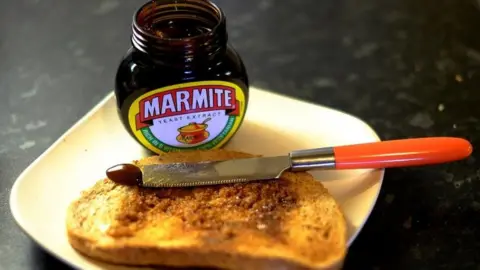Why is Marmite maker Unilever scrapping London HQ?
 Reuters
ReutersBoth Unilever's boss and the UK government were absolutely adamant that the company's decision to scrap its UK headquarters has got nothing to do with Brexit.
In fact, chief executive Paul Polman said the decision to base two of the company's three divisions in the UK was a vote of confidence in the UK and ensured continued jobs and investment. He pointed to the opening of a new £70m advanced manufacturing centre on the Wirral as evidence of the company's commitment to the UK.
Ditching the London HQ is no small matter, however. Although it will keep a listing on the London Stock Exchange, it almost certainly will not be eligible for inclusion in the FTSE 100.
That matters, because the many investment funds that exactly mirror that index are obliged to buy and hold shares of Unilever as long as it's in the index. Those funds will be forced to sell the shares when it leaves.
So why would you want to do that?
Many think the real reason Unilever is leaving is takeovers - defending against them and potentially making them.
When Kraft Heinz launched one of the world's biggest (and shortest lived) takeover bids for Unilever last year, Paul Polman could be found complaining that UK takeover rules pandered to the interests of shareholders over those of customers, workers, suppliers, communities and the environment.
The relevant section of UK law (section 172 of the Companies Act 2006 if you must know) does mention some of these groups but the law is very clear that shareholders' interests are paramount.
 Newscast
NewscastWhat shareholders want, shareholders get. And in a takeover situation, many shareholders want more money now - and so the directors are obliged to deliver that by accepting a good takeover price. (As it happens, Kraft Heinz backed off quickly when it realised the Unilever board was dead set against the deal).
Mr Polman insisted that protection from takeovers is not the reason the company is moving as takeover rules in the UK and the Netherlands are converging - but there are still important differences.
In the Netherlands, those wider interests hold much more legal and cultural sway and so it's harder for a corporate raider to succeed. Mr Polman, a Dutchman, has been a very vocal campaigner for exactly this brand of sustainable capitalism.
It is not impossible to buy a Dutch company, but as PPG Industries found when it tried to buy Dulux owner Akzo Nobel, it's bloomin' difficult. It matters as much who you are and what kind of track record you have as much as how much money you are offering.
Unhelpful signal
Paradoxically perhaps, this move also makes it easier for Unilever to launch takeover bids of its own. A company with two HQs, two legal entities, two boards and a very complicated capital structure is very hard to get around one table to decide whether or not to make purchases of its own. Mr Polman conceded as much when he told me that the new company would be more "agile".
Mr Polman played down the role of the headquarters in a modern organisation.
"The old notion of a headquarters with people smoking cigars, making decisions is over with. We are a very decentralised organisation," he said.
Nevertheless, what was Lever Brothers in the 1890s, and became Unilever in 1930 with the merger with a Dutch margarine company, is now a 100% Dutch company which employs people in the UK. In the same way that McDonald's is 100% American.
The government tried to make a brave face of it today by accentuating the positive news that two of its fastest-growing divisions will be managed by personnel here in the UK. But Greg Clark and Theresa May lobbied hard for this not to happen and will be disappointed that it has.
They both know full well that one of UK's biggest companies abandoning its London HQ sends an unhelpful signal to the rest of the corporate world at a time of fragile confidence.
